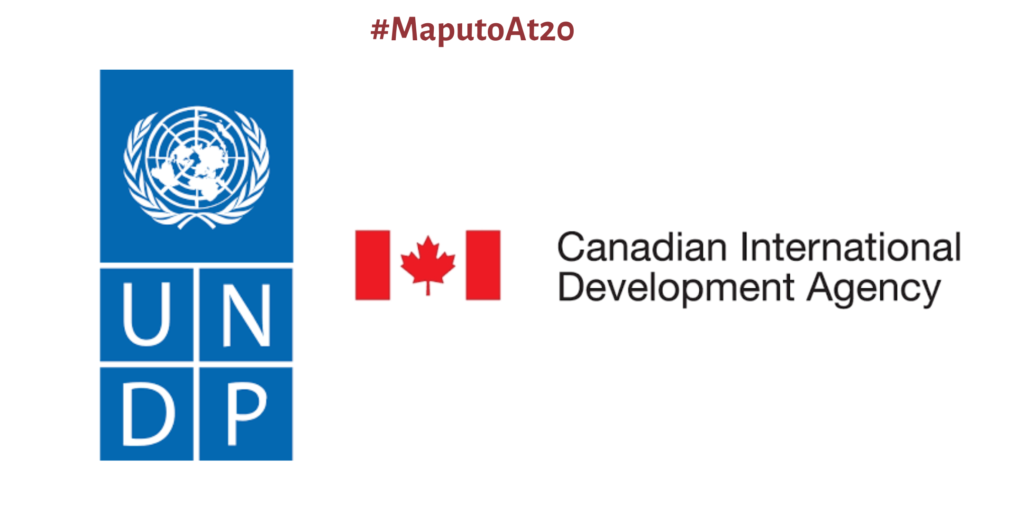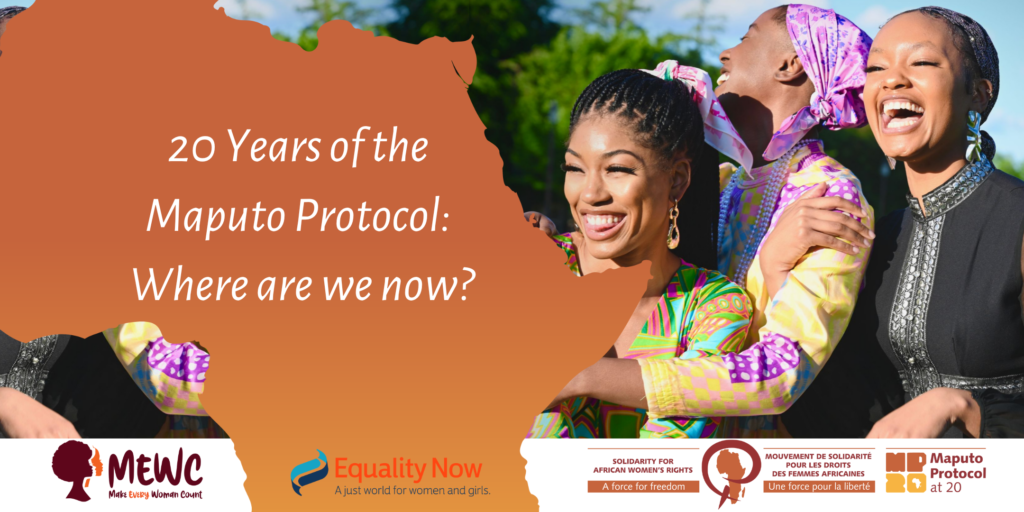To mark the 20th anniversary of the adoption of the Protocol to the African Charter on Human and Peoples’ Rights on the Rights of Women in Africa (commonly referred to as “the Maputo Protocol”), the Solidarity for African Women’s Rights Coalition (SOAWR), Equality Now and Make Every Woman Count (MEWC) have prepared this Progress Report “20 Years of the Maputo Protocol: Where Are We Now?”
The Maputo Protocol demonstrates African states’ commitment to advancing and realising women and girls’ rights and gender equality. It is widely considered to be a progressive and innovative legally binding framework. The Maputo Protocol guarantees African women and girls’ equality and non-discrimination and covers various civil, political, economic, social and cultural rights. Among its notable provisions, the Maputo Protocol explicitly references HIV/AIDS, prohibits female genital mutilation (FGM) and recognises access to safe abortion (under specific conditions) as a women and girls’ right.
The aim of the Progress Report is to provide an overview of where we are now, 20 years since the adoption of the Maputo Protocol, in realising the rights of African women and girls. In this regard, the Report hopes to provide a resource and tool and contribute to advancing the rights of women and girls as articulated in the Protocol beyond this momentous occasion.
The Progress Report summarises the status of ratification and reporting of the Maputo Protocol. It presents key achievements in domesticating and implementation by African Union (AU) Member States and identifies challenges for each of the seven thematic rights areas:
- Economic & Social Welfare Rights
- Rights Related to Marriage (including Child Marriage)
- Health & Reproductive Rights
- Protection from Violence (Including FGM)
- Right to Participation in the Political & Decision-Making Process
- Rights to Peace & Protection from Armed Conflict
- Specially Protected Women
The Progress Report also features case studies highlighting initiatives, tactics and strategies different actors (state and non-state) use to advance the rights addressed in the Report. It also includes recommendations from SOAWR member organisations for AU Member States to promote the implementation of the Maputo Protocol.
Pour marquer le 20ème anniversaire de l’adoption du Protocole à la Charte africaine des droits de l’homme et des peuples relatif aux droits de la femme en Afrique (communément appelé “Protocole de Maputo”), la Coalition Solidarité pour les droits des femmes africaines (SOAWR), Equality Now et Make Every Woman Count (MEWC) ont préparé ce rapport d’avancement “20 ans du Protocole de Maputo : Où en sommes-nous aujourd’hui ?”
Le protocole de Maputo témoigne de l’engagement des États africains à faire progresser et à concrétiser les droits des femmes et des filles et l’égalité entre les sexes. Il est largement considéré comme un cadre juridiquement contraignant progressif et innovant. Le protocole de Maputo garantit l’égalité et la non-discrimination des femmes et des filles africaines et couvre divers droits civils, politiques, économiques, sociaux et culturels. Parmi ses dispositions notables, le protocole de Maputo fait explicitement référence au VIH/sida, interdit les mutilations génitales féminines (MGF) et reconnaît l’accès à l’avortement médicalisé (dans des conditions spécifiques) comme un droit des femmes et des jeunes filles.
L’objectif du rapport d’avancement est de fournir une vue d’ensemble de la situation actuelle, 20 ans après l’adoption du protocole de Maputo, en ce qui concerne la réalisation des droits des femmes et des filles africaines. À cet égard, le rapport espère constituer une ressource et un outil et contribuer à faire progresser les droits des femmes et des filles tels qu’ils sont énoncés dans le protocole au-delà de cette occasion mémorable.
Le rapport d’avancement résume l’état de la ratification et de la notification du protocole de Maputo. Il présente les principales réalisations en matière de domestication et de mise en œuvre par les États membres de l’Union africaine (UA) et identifie les défis à relever dans chacun des sept domaines thématiques énumérés ci-dessous:
- Droits économiques et sociaux
- Droits liés au mariage (y compris le mariage d’enfants)
- Santé et droits génésiques
- Protection contre la violence (y compris les mutilations génitales féminines)
- Droit à la participation au processus politique et décisionnel
- Droits à la paix et à la protection contre les conflits armés
- Femmes spécialement protégées
Le rapport d’avancement présente également des études de cas mettant en lumière les initiatives, tactiques et stratégies utilisées par différents acteurs (étatiques et non étatiques) pour faire progresser les droits abordés dans le rapport. Il comprend également des recommandations des organisations membres de SOAWR à l’intention des États membres de l’UA afin de promouvoir la mise en œuvre du Protocole de Maputo.
Thank you to our development partners, UNDP and the Canadian International Development Agency. Merci à nos partenaires de développement, le PNUD et l’Agence canadienne de développement international.

Share the Report with your networks/Partagez le rapport avec vos réseaux:

